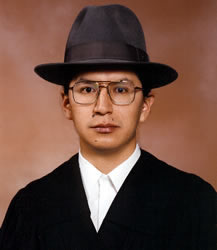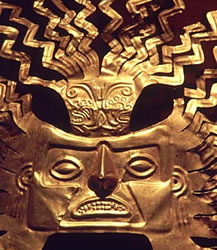|
MARIO INCAYAWAR, M.D., M.Sc., Ph.D.
Professor Mario Incayawar is a physician-scientist, educator, and entrepreneur, interested in cultural neuroscience of pain and analgesia, pain experiences among the Indigenous Peoples of the Americas, traditional healers and global mental health, Amerindian medical knowledge, transcultural psychiatry, and the cultural brain. Professional Background. Professor Incayawar is the first Quichua (Inca) physician to graduate from an Ecuadorian medical school. He has an advanced, integrative, and interdisciplinary training in the biomedical sciences (Ph.D. in pain/analgesia across cultures, University of Montreal, Canada); cultural pharmacogenomics of psychotropic drugs (postdoctoral training at NIMH-Research Center on the Psychobiology of Ethnicity, Harbor-UCLA Medical Center, California); social & transcultural psychiatry (Masters’, McGill University, Canada); and community medicine and mental health (D.E.S.S., University of Montreal, Canada). Professor Incayawar is the recipient of the prestigious John Simon Guggenheim Fellowship 2006. He is the founding director of Runajambi (Institute for the Study of Quichua Culture and Health) in Otavalo, Ecuador. Dr. Incayawar held Henry R. Luce Professorship in Brain, Mind, and Medicine: Cross-Cultural Perspectives at Pitzer, Claremont McKenna and Harvey Mudd Colleges, California, and the William F. Quillian Jr. Visiting International Professor at R-MWC, Virginia , USA. He was re-elected (2008-2011) to the Executive Committee of the Transcultural Psychiatry Section of the World Psychiatric Association. He is a Founding Member of the Editorial Board of the World Cultural Psychiatry Research Review (WCPRR) journal, and Regional Advisor for Ecuador, and is the former Associate Editor, Transcultural Psychiatry Section, WPA Newsletter. Research. Currently Professor Incayawar is completing a study on the analgesic effects of daring words. He conducted research on the efficacy of Inca healers as psychiatric diagnosticians with funding from the John Simon Guggenheim Memorial Foundation, New York. In the past several years, he conducted research on “Llaqui” (depression), and pain experiences among the Quichua communities in the Andes. He also did a research on “Screening Clinically Promising Healing Practices among Native Americans of California,” a study supported by a Faculty Fellowship from the John Randolph Haynes and Dora Haynes Foundation. Academics. For five years, he was both a scientific consultant and editor of the Transcultural Medicine Section of l'Omnipraticien medical magazine, a publication (24 issues/year) targeting French speaking GPs and family practitioners of Quebec, Canada. He has authored 60 papers, nine chapters, and delivered scholarly presentations at over 30 scientific meetings ( America , Europe, Asia ). Professor Incayawar has published two milestone books:
Professor Incayawar teaches the following courses:
He was the organizer of the Luce Faculty Seminar Series at The Claremont Colleges, California. More information about the topics listed below could be found here
|
|
|
||



